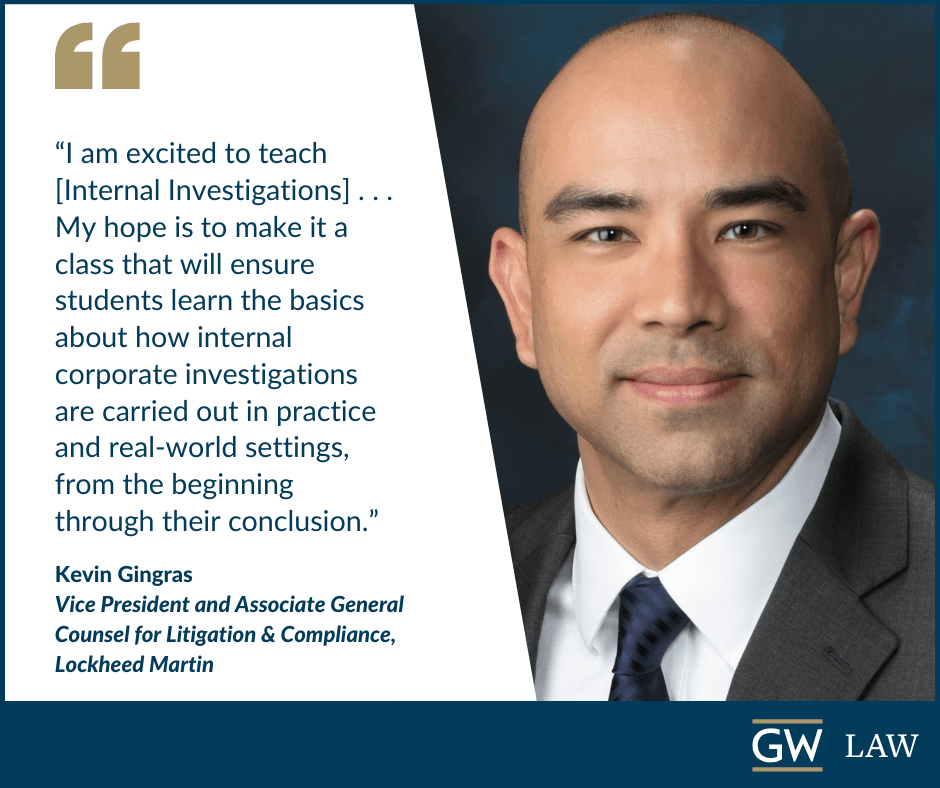We had the pleasure of speaking with Professor Kevin Gingras about his remarkable career path that led to his current role as Vice President and Associate General Counsel for Litigation & Compliance at Lockheed Martin and his decision to create a Government Contracts Internal Investigations class at GW Law (launching Spring 2024). Professor Gingras walked us through his various experiences in the public and private sectors that informed his career in internal investigations, shared his goals for the Internal Investigations course, and offered advice to students interested in entering this field.

Please introduce yourself to the GW Law Government Procurement community. Could you tell us about your role as Vice President and Associate General Counsel for Litigation & Compliance at Lockheed Martin?
As the Vice President and Associate General Counsel for Litigation & Compliance, I am Lockheed Martin Corporation’s chief litigation counsel and report directly to the General Counsel. In that role I lead a team responsible for litigation across the corporation, including high-exposure lawsuits, False Claims Act matters, complex commercial and product liability litigation, class actions, government investigations, bid protests, administrative proceedings, and privileged internal investigations. We also lead and coordinate some of the Legal Department’s enterprise-wide compliance efforts, as well as our Federal Acquisition Regulation mandatory disclosure regime.
You have had a fascinating career path. Can you tell us about it?
I had the good fortune to start my legal career with two judicial clerkships following law school —one with a U.S. District Court judge and one with a judge on the U.S. Court of Appeals. I then joined the Department of Justice, where I had various roles over the next 13 years.
At the outset, I was a criminal prosecutor and appellate specialist focused on national security, public corruption, fraud, and constitutional questions. I was part of the prosecution team in the trial against Zacarias Moussaoui, an al-Qaeda member who conspired to participate in the terrorist attacks of September 11, 2001. He remains the only person ever charged and convicted in a U.S. courtroom for his role in the attacks and is serving six consecutive life terms at the federal supermax prison in Colorado. I later presented oral argument for the government in Moussaoui’s direct appeal of the case to the U.S. Court of Appeals for the Fourth Circuit. Representing the United States in that case was an incredible privilege and remains some of the most humbling and meaningful work I have done in my career.
I later joined the FBI, first as Special Counsel to then-Director Robert Mueller, a role in which I was his principal staff advisor on national security matters, including counterterrorism, intelligence sharing, and criminal enforcement-related issues. In that capacity, I represented the FBI in the interagency process of the Intelligence Community and the National Security Council. He then appointed me to serve as Deputy Chief of Staff, where I continued as an advisor in addition to helping manage the daily operations of the Director’s Office.
I spent the last several years of my time at DOJ in the Criminal Division’s Fraud Section, where I investigated and prosecuted individuals and corporations for criminal violations of the Foreign Corrupt Practices Act, accounting and securities fraud, money-laundering and other complex white collar crimes.
After leaving DOJ, I joined Lockheed Martin.
We are excited to be offering your new course this semester – Internal Investigations. Can you tell us about it?
I am excited to teach it. The purpose of this class is to introduce students to internal corporate investigations through readings, class discussion, and a simulation. My hope is to make it a class that will ensure students learn the basics about how internal corporate investigations are carried out in practice and real-world settings, from the beginning through their conclusion—from deciding whether to investigate, to thinking through and developing an investigation strategy and plan, to collecting evidence and crafting interviews, and then effectively documenting that investigation.
What motivated you to create the course?
It is an important topic that is prevalent in so many areas of the law but that too few students are exposed to in law school. I wish I could have taken this type of class when I was a law student. I have enjoyed practicing and gaining an expertise in this area, and I also find teaching law students to be a rewarding vocation.
Are there any emerging issues or trends in this area that prospective students should be aware of?
Yes, and emerging trends will be one of the areas we will focus on in the class. But generally speaking, the standards for corporate criminal and regulatory liability are broad, and we are in an environment that increasingly emphasizes strong enforcement. It would not be a perfect line, but if you were to chart the last twenty plus years, you would clearly see continued increased government enforcement, and as a result, increased number of, and resources devoted to, internal investigations.
Why are internal investigations an important component of our students’ educational experience at GW Law?
Over the last twenty plus years, it has become an essential tenet of corporate best practices to use internal investigations as a means to deal with potential misconduct. Shareholders, government regulators, and the public, all expect that a company will conduct an appropriate investigation when it detects a potential violation of law or other misconduct. That expectation is magnified when a company is part of a heavily regulated industry, and in some cases the failure to appropriately investigate misconduct may itself be a violation of law for public companies.
In addition, companies that have a strong ethical culture and are committed to fostering and maintaining it—like Lockheed Martin, in my own experience—recognize that conducting timely and appropriate internal investigations into allegations of misconduct is critical. As a result of all this, internal corporate investigations are now integral to so many different practices of law, and yet very few students are introduced to the topic in law school. Whether you intend to practice in-house, at a law firm with corporate clients, as a government regulator, or as a white collar prosecutor, you will need to understand how these investigations work and the various complex issues surrounding them.
What advice would you give a student considering a career path that involves going in-house and conducting internal investigations? How can a student or a recent graduate break into this field?
My principal piece of advice would be to do something else first. It is not an absolute, but I do think if you want to do investigations work, it makes sense to do them in a variety of contexts – at a law firm, in the government, etc. In my own experience, being a prosecutor for the United States was a privilege in its own right, but it also proved to be a great training ground to develop as an investigator and litigator.

